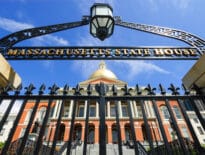Two economic surveys showed that the U.S. economy is continuing to suffer from high-interest environment and is likely headed for a recession after the announcement of another Federal Reserve rate hike Wednesday, even as Federal Reserve economists have stopped forecasting that recession is on the horizon.
Fed Chair Jerome Powell revealed the central bank’s staff economists stopped envisioning a “mild” recession later this year during a Wednesday press conference discussing the rate increase.
The most recent edition of the Citizens Business Conditions Index (CBCI), released by Citizens Bank Thursday, stated that the rapid interest rate increases contributed to the rise in unemployment insurance claims and a slowdown in small business formation, causing the index to decline to 48.5 percent in the second quarter compared to the 51.94 percent a quarter ago and the 50.44 percent score as of the end of last year. This is the lowest score in the index since 2014.
From April to June, the CBCI pointed out that the elevated interest rates led to decreased new applications in most states, an increase in initial jobless claims and softening of national employment numbers, and decreased ISM manufacturing index. Despite the negatives, Citizens’ commercial banking was broadly strong, suggesting that conditions at many middle-market and mid-corporate businesses remain positive, and there was growth in ISM non-manufacturing component.
Eric Merlis, managing director and co-head of global markets at Citizens Bank, said in a statement that the overall U.S. economy has begun to slow in the second quarter and the business environment is struggling to adapt to the rate hike campaign of the Fed, as inflation falls, labor market softens, and creation of new businesses stalls.
He said that before the Fed’s rate hike announcement on Wednesday, the labor market was showing signs of stability.
“The second-quarter CBCI shows a business environment where activity has slowed as interest-rate hikes seem to be working to curb inflation. All eyes will be on the job market to see if the Fed can balance its efforts to fight inflation while minimizing impacts on employment,” Merlis said.
Meanwhile, IntraFi’s second-quarter Bank Executive Business Outlook survey showed that 73 percent of the respondents do not believe that the Fed will be able to achieve a soft landing for the U.S. economy as the rate hikes persist.
Half or 51 percent of the surveyed think that overall economic conditions will turn moderately worse in the next 12 months, and 32 percent said it will remain the same.
The IntraFi survey pointed to banks’ expectations of increased competition for deposits, decreased loan demand, and higher bank funding, costs, and capital reserves. This result points to further compression of bank margins, tighter lending standards, and increased deposit rates for depositors.
This sentiment was echoed in S&P’s U.S. Bank Outlook Survey, with 41 percent of bank executives perceiving that a recession is likely to occur in six to nine months’ time.




 |
| 


